江苏省七年级英语上册 Unit 4 My day(第1课时)教案 (新版)牛津版
七年级英语上册 Unit 4 My day Reading 1教案 (新版)牛津版
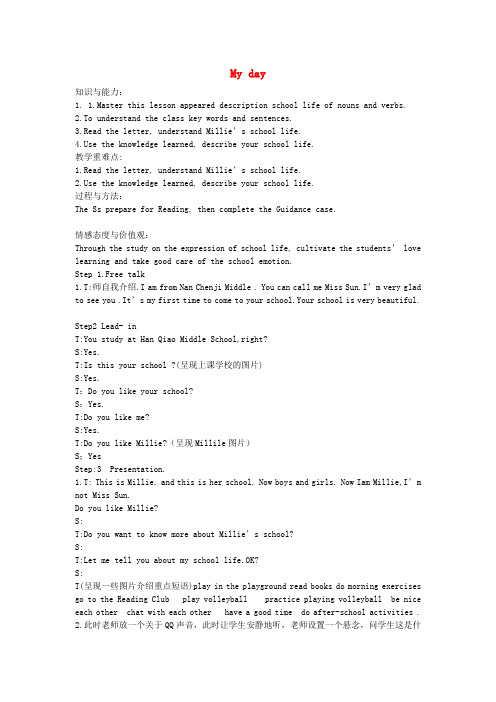
My day知识与能力:1. 1.Master this lesson appeared description school life of nouns and verbs.2.To understand the class key words and sentences.3.Read the letter, understand Millie’s school life.e the knowledge learned, describe your school life.教学重难点:1.Read the letter, understand Millie’s school life.e the knowledge learned, describe your school life.过程与方法:The Ss prepare for Reading, then complete the Guidance case.情感态度与价值观:Through the study on the expression of school life, cultivate the st udents’ love learning and take good care of the school emotion.Step 1.Free talk1.T:师自我介绍.I am from Nan Chenji Middle . You can call me Miss Sun.I’m very glad to see you .It’s my first time to come to your school.Your school is very beautiful.Step2 Lead- inT:You study at Han Qiao Middle School,right?S:Yes.T:Is this your school ?(呈现上课学校的图片)S:Yes.T:Do you like your school?S:Yes.T:Do you like me?S:Yes.T:Do you like Millie?(呈现Millile图片)S;YesStep:3 Presentation.1.T: This is Millie. and this is he r school. Now boys and girls. Now Iam Millie,I’m not Miss Sun.Do you like Millie?S:T:Do you want to know more about Millie’s school?S:T:Let me tell you about my school life.OK?S:T(呈现一些图片介绍重点短语)play in the playground read books do morning exercises go to the Reading Club play volleyball practice playing volleyball be nice each other chat with each other have a good time do after-school activities .2.此时老师放一个关于QQ声音,此时让学生安静地听,老师设置一个悬念,问学生这是什么声音?学生肯定答不出来。
七年级英语上册 Unit 4 My day(第1课时)教案 (新版)牛津版
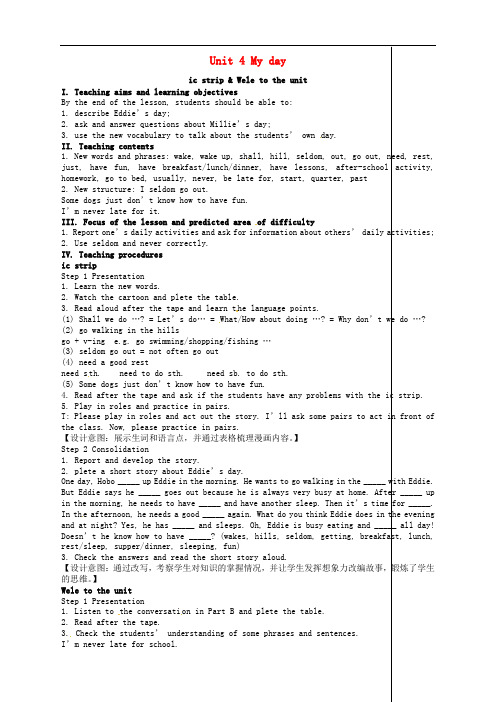
tudents’ own day.1. New words and phrases: wake, wake up, shall, hill, seldom, out, go out, need, rest, III. Focus of the lesson and predicted area3. Read aloud after the tape and learn t he language points.What/How about doing …? = Why don’t we do …? need se1. Listen to the conversati on in Part B and plete the table.start lessonsat a quarter past eightenjoy schoolT: OK, do you have any questions to ask me? “I’m never late for it.” Who can translate it into Chinese? What does “never” mean?4. Develop the conversation.【设计意图:通过书上提供的表格进行扩展练习。
】Step 2 Consolidation1. plete the passage, check the answers and read the passage aloud.T: OK, you really did a good job. Now are you clear abou t Millie’s daily activities? Please plete this short passage about Millie’s day.Millie is a hard-working student. She ______ up early in the morning. She goes to _______ at 7:20. She’s _______ late for school. Before the first lesson starts, Millie and all her classmates do morning ________. She has lunch at ten to ________. The school finishes at four ______ in the afternoon. Then it’s time for after-school ________. She always has fun. In the evening, Millie watches TV for ______ an hour. It’s her favourite time of the day. Then she needs to do her __________. She always does it carefully. She usually goes to _______ at 9:30.2. Report your day.(1) plete the table in the book abo ut the students’ own days.T: Now, I know something about Eddie’s and Millie’s days now. Next, I’d like to know about your day. Please write down the time and the activities in the table.(2) Practice reporting the students’ own da ys.T: OK, p lease try to report your day according to the table you finished just now. I’ll give you only two minutes to practice. Please try to make your report clear and interesting.(3) Ask a student to report and the other students to listen carefully.T: Time is up! Are you ready to report your day? When one student is telling about his or her day, the others should listen carefully. I will ask you questions after the report. Who’d like to be the first to tell us about your day?T: Thank … for your report. Now q uestions for the other students. Are you ready? Question 1 …【设计意图:让学生结合自己的实际情况练习,达到学以致用。
牛津译林版七年级上册Unit 4《My day》(第1课时)说课稿

牛津译林版七年级上册Unit 4《My day》(第1课时)说课稿一. 教材分析《牛津译林版七年级上册Unit 4 My day》是一篇以学生日常生活为背景的课文。
通过学习本课,学生可以掌握一般过去时的运用,学会如何描述自己的日常生活。
本课内容贴近学生生活,有利于激发学生的学习兴趣,提高学生的英语水平。
二. 学情分析七年级的学生已经掌握了基本的英语语法知识,具有一般现在时和一般过去时的初步认识。
但在实际运用中,学生对一般过去时的掌握还不够熟练,需要通过本课的学习进一步巩固。
此外,学生对英语写作和口语表达的欲望较强,为本课的教学提供了良好的基础。
三. 说教学目标1.知识目标:学生能够掌握一般过去时的基本结构,学会如何用英语描述自己的日常生活。
2.能力目标:学生能够熟练运用一般过去时进行口头和书面表达,提高英语交际能力。
3.情感目标:通过本课的学习,学生能够培养对英语的兴趣,增强自信心,提高自主学习能力。
四. 说教学重难点1.教学重点:学生能够掌握一般过去时的基本结构,学会如何用英语描述自己的日常生活。
2.教学难点:学生对一般过去时的运用,特别是在实际语境中的运用。
五. 说教学方法与手段本课采用任务型教学法,通过创设情境,引导学生参与课堂活动,提高学生的学习兴趣和积极性。
同时,运用多媒体教学手段,如图片、视频等,帮助学生更好地理解课文内容,提高课堂效果。
六. 说教学过程1.导入:以一幅描绘学生日常生活的图片引导学生思考,引出本课主题。
2.新课呈现:通过播放一段视频,让学生直观地感受一般过去时的运用,然后引导学生学习课文内容。
3.课堂活动:学生分组进行角色扮演,模拟课文中的场景,运用一般过去时进行交流。
4.写作练习:学生根据课堂所学,写一篇关于自己一天的日记,巩固一般过去时的运用。
5.口语展示:学生自愿上台展示自己的口头表达能力,其他学生进行评价。
6.课堂小结:教师总结本节课的学习内容,强调一般过去时的运用。
七年级英语上册Unit4MydayGrammar教案(新版)牛津版

My dayTeaching aims:1. To learn to use prepositions of time “in”, “on” and “at”2. To learn to use adverbs of frequency3. To learn and master the important words and phrasesImportant and difficult points:Learn to use prepositions of time “in”, “on” and “at” correctly Teaching method:Task-based Learning MethodTeaching aids:a slide projector, slides and some objectsTeaching Procedures:Step One. Check the previewTranslate some phrasesStep Two. Cooperative inquiry One1. Free talkAsk students to use “in”, “on” and “at” to talk about our daily life. T: What time do you go to school?S1: I go to school at 7 o’clock.T: On what days do you usually Tuesday and Friday.T: When do you usually the morning.T: We use different prepositions to talk about time.2. The usage of preposition “in”(1)Ask students to read some sentences, pay attention to the prepositionsMy parents watch TV in the evening.We plant trees in March every year.In Hainan, it never snows in winter.The 22nd World Cup is in 2022.(2)Ask students to find out the rules of using “in”(3)Help students to summarize the rules(4)Ask students to read the sentences together3. The usage of preposition “on”(1)Ask students to read some sentences, pay attention to the prepositionsWe do not go to school on Saturday.Our summer 1 July.Amy goes swimming on Sunday morning.They on Children’s Day.(2)Ask students to find out the rules of using “on”(3)Help students to summarize the rules(4)Ask students to read the sentences together4. The usage of preposition “at”(1)Ask students to read some sentences, pay attention to the prepositionsMillie o’clock.At lunchtime, in China start school at 6 years old.(2)Ask students to find out the rules of using “at”(3)Help students to summarize the rules(4)Ask students to read the sentences togetherStep Three. Cooperative inquiry Two1. Free talkT: Tommy and Mille often chat with each other on the Internet.Do you often chat on the Internet?S1: Yes, I do. I chat with my friends on the Internet every day.T: You chat with your friends on the Internet every day. So you always chat with your friends on the Internet.S2: No, I don’t. I only chat on the Internet on Sundays.T: You only chat on the Internet on Sundays. So you sometimes chat on the Internet.T: Adverbs of frequency tell you things . There are some adverbs of frequency, such as never, seldom, sometimes, often, usually, always.2. Ask students to read the pictures in Part B by themselves3. Divide students into eight groups and try to find out the rules4. Ask a student from each group to summarize the rules5. Help students to summarize the rules(1)always>usually>often>sometimes>seldom>never(2)We put an adverb of frequency before a verb except when the verb is to be.(3)When we ask questions, we use “”.Step Four. Personalized display1. Complete Tommy’s email2. Complete the exercises in Part B(1) Simon loves playing football. He __________ plays football in the playground.(2) Sandy does not of the promotion1. How to use prepositions of time “in”, “on” and “at”2. How to use adverbs of frequencyStep Six. Detection feedback1. Fill in the blanks with “in”, “on” or “at”2. Choose the correct answer for each sentence3. Change the following sentences correctlyStep Seven. Homework1. Make a dialogue to talk about your weekend2. Write an article about your diet and lifestyle。
牛津译林版七年级上册Unit 4《My day》(第1课时)教学设计
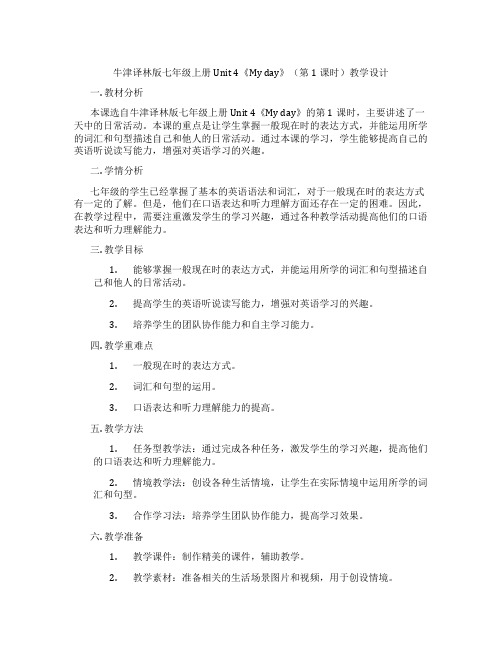
牛津译林版七年级上册Unit 4《My day》(第1课时)教学设计一. 教材分析本课选自牛津译林版七年级上册Unit 4《My day》的第1课时,主要讲述了一天中的日常活动。
本课的重点是让学生掌握一般现在时的表达方式,并能运用所学的词汇和句型描述自己和他人的日常活动。
通过本课的学习,学生能够提高自己的英语听说读写能力,增强对英语学习的兴趣。
二. 学情分析七年级的学生已经掌握了基本的英语语法和词汇,对于一般现在时的表达方式有一定的了解。
但是,他们在口语表达和听力理解方面还存在一定的困难。
因此,在教学过程中,需要注重激发学生的学习兴趣,通过各种教学活动提高他们的口语表达和听力理解能力。
三. 教学目标1.能够掌握一般现在时的表达方式,并能运用所学的词汇和句型描述自己和他人的日常活动。
2.提高学生的英语听说读写能力,增强对英语学习的兴趣。
3.培养学生的团队协作能力和自主学习能力。
四. 教学重难点1.一般现在时的表达方式。
2.词汇和句型的运用。
3.口语表达和听力理解能力的提高。
五. 教学方法1.任务型教学法:通过完成各种任务,激发学生的学习兴趣,提高他们的口语表达和听力理解能力。
2.情境教学法:创设各种生活情境,让学生在实际情境中运用所学的词汇和句型。
3.合作学习法:培养学生团队协作能力,提高学习效果。
六. 教学准备1.教学课件:制作精美的课件,辅助教学。
2.教学素材:准备相关的生活场景图片和视频,用于创设情境。
3.课堂练习:设计相关的练习题,巩固所学知识。
七. 教学过程1.导入(5分钟)利用图片和视频展示一天中的不同活动,引导学生谈论自己的日常活动。
2.呈现(10分钟)展示本课的主要词汇和句型,如:get up, go to school, have lunch等,并引导学生进行朗读和模仿。
3.操练(10分钟)分组进行角色扮演,让学生运用所学的词汇和句型描述自己和他人的一天。
4.巩固(10分钟)设计课堂练习,让学生完成相应的句子填空和对话编写任务。
七年级英语上册 Unit 4 My day Reading教案 (新版)牛

3.Ask the students read the text and give them some questions to help them understand the text.
Unit 4
集 备 部 分
课 题
7AUnit 4Reading
中心发言人
时 间
Teaching aims and demands:
1.Tolearn words and phrases: because buy whole day other spend Tuesday Friday also volleyball practise swimmer e-mailmore than lots of have fun spend …doing
Ask the other students to explain the meaning of the words.
Step3.Reading
1.Ask the students listen to the tape and answer: Who is Millie’s best friend?
Teaching procedure:
Step1Revision
1.Ask students to talk about Millie’s day with the given information.
Millie’s day
6.30a.m.
Get up
3.30p.m.
Do after-school
4)Millie spends three hours a day doing her homework.
【2020最新】七年级英语上册 Unit 4《My day》(Reading 1)教案牛津版

教学资料范本【2020最新】七年级英语上册 Unit 4《My day》(Reading1)教案牛津版编辑:__________________时间:__________________Teaching aims and demands:1..Learn Millie’s school life and grasp the main words 、phrases ..2..Learn how to describe one’s school life and practice reading skills ..3..Love our school , love our life ..Step 1.. Lead-inPlay a short video about our school life , let students say some words or phrases about it .. The teacher shows some pictures to students to sum up the activities they often do at school .. And teach some new words ..Step 2.. Presentation1..The teacher says : I think our school life is interesting and colorful .. What about Millie’s schoollife ? Do you want to know ? Millie writes an email to her new online friend Tommy .. In her email , we’ll know her school ..Step 3.. Listen and answer1..)What is Millie’s favourite subject?2..)Is she good at it ?Step 4.. Read the email quietly then finish Part B1 on Page 45Students check the answers like this :A:When do they do morning exercises ?B:They do morning exercises at eight ..Step 5.. Careful Reading1..Read Paragraph 1 & 2 carefully , then ask and answer..1..) What’s the name of Millie’s school?2..)Does she love her school ?3..) What do they do first in the morning ?2..Read Paragraph 3、4 & 5,then judge T or F..1..)Millie seldom chats with her friends after class..2..)Millie only goes to the Reading Club on Tuesday..3..)Millie is a member of the school swimming team..Step 6.. Play a gameStep 7.. Practicein the afternoon, have a good time, chat with,play in the playground, practise, nice ,start,Millie is a new student at Sunshine Middle School .. Herschool ________at 8:00 in the morning .. Millie has a lotof friends at School .. They are all ______ to her .. Afterclass , they often _____________ each other or _____________________.. Sometime she goes tothe library ________________.. She often reads books in theReading Club .. She also likes playing volleyball.. She is amember of the school volleyball team..She ___________ afterschool on Wednesday afternoon .. She always_______________at her school..Step 8.. ConsolidationGroup work: Can you talk about your school life ..Student1 : School and lessonsStudent2 : Friends at schoolStudent3 : HobbiesStudent4 : After-school activitiesStudent5 : FeelingStep 9.. Watch and discuss1..)What's the differences between our school and theirs ?2..)What do you think of their school life ?3..)What should we do ?Step 10.. Homework1..Read and recite Millie’s email..2.. Write something about your school life in English and then talk about it with your classmates..【课后拓展】阅读理解:Hi.. I’m LingLing.. I’m a student at No.. 14 Secondary School.. Do you want to know my life? Let me tell you about it.. I usually get up at 7:00 in the morning.. I have my breakfast at 7:10.. My parents always prepare(准备)the breakfast for me.. I go to school at 7:30.. We have 7 lessons every day from Monday to Friday.. I like English lesson very much.. After school, I like playing ping-pong and basketballwith my friends.. There is a very big playground in our school..( )1.. I have my breakfast at ______..A.. 7:00B.. 7:10C.. 7:30D..7:20( )2.. I have seven lessons ____..A.. every dayB.. at the weekendC.. five days a weekD.. twice a week( )3.. I like ______ very much..A.. EnglishB.. ChineseC.. art lessonD.. all lessons( )4.. There is a big ______ in No.. 14 Secondary School..( )5.. I like playing ______ with my friends..A.. ping-pong and basketballB.. footballC.. football and basketballD.. basketball。
七年级英语上册 Unit 4 My day Grammar教案 (新版)牛津版

Unit 4 My dayGrammarTeaching aims and learning objectivesBy the end of the lesson, students should be able to:1. use prepositions to talk about time correctly;2. use the adverbs of frequency correctly;3. grasp the usage of “how often”;4. use the se items of grammar to talk about their dai ly life.Teaching contents1. New words and expressions: would, would like, life, all the best, roller skating2. New structure: How often do they exercise?Focus of the lesson and predicted area of difficulty1. Know better about some usages of the prepositions of time;2. Tell the difference between “how often” and “how many times”.Step one温故习新,导引自学correct prepared exercises and solve the problemStep two交流质疑,精讲点拨Teaching proceduresA. Prepositions of timeStep 1 Presentation1. Find out the expressions which should be put after “in/on/at” one by one.2. Read the expressions together.3. Find out more similar expressions.4. Work out the rules.(1) in: in the evening (part of day), in December (months), in 2013 (years), in winter (season)(2) on: on Sunday, on December 31st (days & dates), on the evening of July 4th, on M onday afternoon (parts of a specific da y), on Children’s Day (specific holidays or days) (3) at: at seven, at noon, at lunchtime (time of day), at (the age of) 16 (age), at theSpring Festival (specific holidays or festivals), at the weekendStep 2 Practice1. Finish the exercises on Page 47 on the Students’ Book.2. Fill in the blanks with “in”, “on” or “at”.(1) We don’t go to school _______ Sunday. (on)(2) My birthday is _______ April 1st. (on)(3) We’re going to see the doctor _______ four o’clock. (at)(4) He often takes Eddie for a walk ________ the evening. (in)(5) They have a long holiday ______ November. (in)(6) He was born ________ 1992. (in)(7) He likes reading newspapers _______ breakfast. (at)(8) She starts learning English _______ 6 o’clock. (at)(9) It’s cold _______ w inter in China. (in)(10) They play the game ________ the evening of 31st October. (on)(11) We’ll have one party _______ next week. (/)(12) My f riends give me some pre sents _____ Christmas every year. (at)(13) He got home ________ the morning of the 4th last month. (on)(14) The story happened ________ a cold winter morning. (on)(15) I never go to a party _______ Halloween. (on)(16) My father seldom has free time ________ the weekend. (at)(17) It sometimes snows _______ winter in Wuxi. (in)(18) He often takes Eddie for a walk ________ the evening. (in)(19) My family usually get together to have a big dinner ______ the Mid-autumn Festival. (at)(20) He always goes to the library _______ Mondays. (on)B. Adverbs of frequencyStep 1 Presentation1. Show the six adverbs of frequency.2. Finish the exercises on Page 48 on the Students’ Book.(1) Simon loves playing football. He _____ plays football in the playground. (often)(2) Sandy doesn’t have much time to play tennis. She ______ pl ays tennis. (seldom)(3) Amy is a member of the swimming team. She ______ swims after school. (usually)(4) Daniel doesn’t like basketball. He _____ plays it. (never)(5) Kitty goes to her dancing lesson every da y. She _______ dances for half an hour. (always)(6) Millie _________ goes roller skating, bu t she’s not good at it. (sometimes)3. Work out the rules.(2) Find out the usages of “how often”.Show some examples to help students find out the different usages. Find out and remember the usages of “how often”. Tell the difference between “how often” and “how many times”.a. Sandy never reads books about sports.→How often does Sandy read books about sports?b. Millie borrows books from the li brary once a week. →H ow often does Millie borrow books from the library?c. The club has a “Reading Week” every year. →How often does the club have a “Reading Week”?d. Simo n goes to the Reading Club three times a week. →How often does Simon go to the Reading Club?e. Simon goes to the Reading Club three times a week. →How many times a week does Simon go to the Reading Club?Step 2 PracticeT: We have learned a lot about the prepositions and the adverbs. Do you have confidence to challenge the game? It has three levels. Only if you pass the first level, you can go on to the next one. Only if you pass all the levels, you will win. Do you have confidence?1. Fill in the blanks.Do you know much about the school?(1) The new term begins ______ September 1st. (on)(2) The school day starts ______ 8 a.m. (at)(3) The students don’t need to go to school ______ Saturday. (on)(4) The students chat with each other _____ lunchtime. (at)(5) The school has an outing _____ spring or autumn. (in)(6) Every class has a party _____ Christmas. (at)(7) T he school has an “Art Festival” _____ December. (in)(8) The students go running _____ cold winter mornings. (on)(9) The students go to different clubs _____ every Tuesday afternoon. (/)2. Answer the question and fill in the blanks.Do you know much about the teachers?(1) Ask and answer.a. How often does Miss Zhou watch a film? (Once a week.)b. When does she watch a film? (On Friday afternoon.)(2) Fill in the b lanks.Mr Liu does exercise ________ _________. _________ he goes jogging, __________ he plays badminton. (every day, Sometimes, sometimes)He goes jogging _____ ______ ________, and he plays badminton ______ ______ _________. (in the evening, at the weekend)3. Make a dia logue and report.Do you know much about the classmates?A: What do you like to do at/after school every day?B: I like …A: How often do you …?B: I …A: When do you do it?B: I do it on/in …_______ likes to _______ at/after school. He/She … He/She does it on/in …T: When your classmates report, the rest of you should listen to them carefully and take some notes. After that, you should say something about their report. These sentence patterns can help you.Step three当堂反馈,拓展迁移《学评》Step four Homework1. Practice talking about your daily activities with a new partner by using the prepositions of time and the adverbs of frequency;2. Finish the exercises of this period in the Workbook.【教学反思】。
牛津译林版七年级英语上册Unit4MyDay教案(20201203043057)
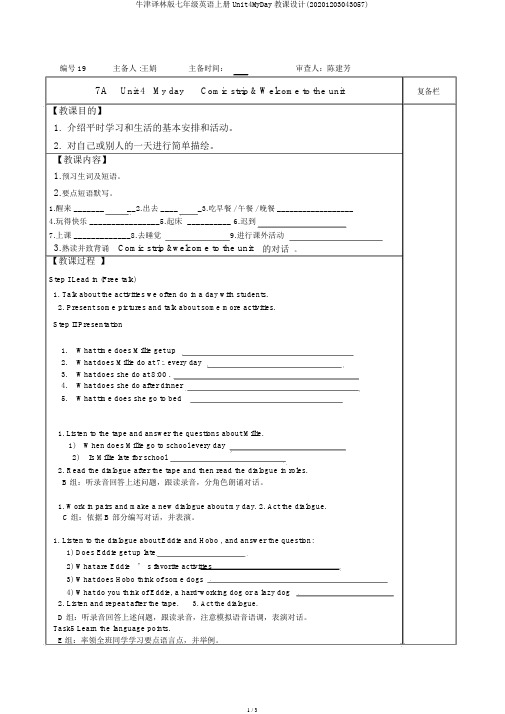
编号 19主备人 :王娟主备时间:审查人:陈建芳7A Unit 4 My day Comic strip & Welcome to the unit复备栏【教课目的】1.介绍平时学习和生活的基本安排和活动。
2.对自己或别人的一天进行简单描绘。
【教课内容】1.预习生词及短语。
2.要点短语默写。
1.醒来 _________2.出去 ____ 4.玩得快乐 ________________5.起床7.上课 _____________8.去睡觉_3.吃早餐 / 午餐 / 晚餐 __________________ __________ 6.迟到9.进行课外活动3.熟读并致背诵Comic strip &welcome to the unit的对话。
【教课过程】Step I Lead in (Free talk)1.Talk about the activities we often do in a day with students.2.Present some pictures and talk about some more activities.Step II Presentation1.What time does Millie get up2.What does Millie do at 7:. every day3.What does she do at 8:00 .4.What does she do after dinner5.What time does she go to bed1.Listen to the tape and answer the questions about Millie.1)When does Millie go to school every day2)Is Millie late for school2.Read the dialogue after the tape and then read the dialogue in roles.B 组:听录音回答上述问题,跟读录音,分角色朗诵对话。
七年级英语上册 Unit 4《My day》(Reading 1)教案 (新版)牛津版

Unit 4 My dayTeaching aims and demands:1.Learn Millie’s school life and grasp the main words 、phrases .2.Learn how to describe one’s school life and practice reading skills .3.Love our school , love our life .Step 1. Lead-inPlay a short video about our school life , let students say some words or phrases about it . The teacher shows some pictures to students to sum up the activities they often do at school . And teach some new words .Step 2. Presentation1.The teacher says : I think our school life is interesting and colorful . What about Millie’s school life ? Do you want to know ? Millie writes an email to her new online friend Tommy . In her email , we’ll know her school .Step 3. Listen and answer1.)What is Millie’s favourite subject?2.)Is she good at it ?Step 4. Read the email quietly then finish Part B1 on Page 45Students check the answers like this :A:When do they do morning exercises ?B:They do morning exercises at eight .Step 5. Careful Reading1.Read Paragraph 1 & 2 carefully , then ask and answer.1.) What’s the name of Millie’s school?2.)Does she love her school ?3.) What do they do first in the morning ?2.Read Paragraph 3、4 & 5,then judge T or F.1.)Millie seldom chats with her friends after class.2.)Millie only goes to the Reading Club on Tuesday.3.)Millie is a member of the school swimming team.Step 6. Play a gameStep 7. PracticeComplete Millie's school life .(方框选词填空)in the afternoon, have a good time, chat with,play in the playground, practise, nice ,start,Millie is a new student at Sunshine Middle School . Her school ________at 8:00in the morning . Millie has a lot of friends at School . They are all ______ toher . After class , they often _____________ each other or _____________________. Sometime she goes to the library________________. She often reads books in the Reading Club . She also likes playingvolleyball. She is a member of the school volleyball team.She ___________ afterschool on Wednesday afternoon . She always_______________ at her school.Step 8. ConsolidationGroup work: Can you talk about your school life .Student1 : School and lessonsStudent2 : Friends at schoolStudent3 : HobbiesStudent4 : After-school activitiesStudent5 : FeelingStep 9. Watch and discuss1.)What's the differences between our school and theirs ?2.)What do you think of their school life ?3.)What should we do ?Step 10. Homework1.Read and recite Millie’s email.2. Write something about your school life in English and then talk about it withyour classmates.【课后拓展】阅读理解:Hi. I’m LingLing. I’m a studen t at No. 14 Secondary School. Do you want to knowmy life? Let me tell you about it. I usually get up at 7:00 in the morning. I have my breakfast at 7:10. My parents always prepare(准备)the breakfast for me. I go to school at 7:30. We have 7 lessons every day f rom Monday to Friday. I like English lesson very much. After school, I like playing ping-pong and basketball with my friends. There is a very big playground in our school.( )1. I have my br eakfast at ______.A. 7:00B. 7:10C. 7:30D.7:20( )2. I have seven lessons ____.A. every dayB. at the weekendC. five days a weekD. twice a week( )3. I like ______ very much.A. EnglishB. ChineseC. art lessonD. all lessons( )4. There is a big ______ in No. 14 Secondary School.A. gardenB. libraryC. playgroundD. computer room( )5. I li ke playing ______ with my friends.A. ping-pong and basketballB. footballC. football and basketballD. basketball。
牛津译林版七年级英语上册Unit 4 My day教案

牛津译林版七年级英语上册Unit 4 My day教案Comic strip and Welcome to the unit精品教案教材分析Comic strip &Welcome to the unit是本单元的第一课时,通过Eddie和Hobo 之间的对话,引出本单元的主题:我的一天。
通过Millie一天的日常活动安排来了解Millie的学校生活并与自己的进行比较。
教学目标:基础知识掌握词汇:wake , shall , hill , seldom, out , need , rest , just , after-school , activity , homework , usually , never , start 词组:wake up , go out , have breakfast / lunch / dinner , do homework , go to bed , be late for句型:I seldom go out . I always need a good rest . I’m never late for it .At a quarter past eight .基本技能1.介绍日常学习和生活的基本安排和活动;2. 对自己和他人的一天进行简单描述。
综合素质将自己的一天活动进行描述,从中学会合理安排时间并珍惜时间。
教学重难点及突破重点:介绍日常学习和生活的基本安排和活动;难点:对自己和他人的一天进行简单描述。
教学突破:将一天的校园活动制成表格,降低师生对话的难度。
教学准备教师准备:多媒体课件学生准备:预习本课时的内容。
教学设计Step I Lead-in (导入部分)1. Today we’ll lear n Unit 4 My day .Discuss in groups :How do you usually spend your day ?2. Present and learn the new words .Step II Presentation(新授部分)1.Listen and answer the questions: What does Eddie do every day ? What does Hobo think of dogs like Eddie ?2.Read after the tape .3.Help Ss understand the following phrases and sentences : 1)wake up 2) Is it time for breakfast ? 3)I seldom go out 4) I always need a good rest 5) Some dogs just don’t know how to have fun .4.Work in pairsStep III Present "Welcome to the unit" (新授Welcome to the unit)1.Look at the table of Millie’s day . Please answer my questions : What time does Millie get up ? What does Millie do at 7:00 a.m. every day ? I would like to go to school with Millie . What time can I meet her at her gate ? What does she do at 8:00 a.m. ? How many hours does Millie have lessons every day ? Does she go home at 4:00 p.m. ? What does she do ? What does she do after dinner ? What time does she go to bed ?2.Listen to the tape and answer : Is Millie often late for school ?3.Read after the tape4.Are your daily activities the same as Millie’s ? Complete the table on the right with your own information .5.Work in groups of four to discuss your own day . You can use Millie and her aunt’s conversation as a model .6.Each group chooses one student to give a report and introduce the daily activities ofthe group members .nguage points .Phrases : get up , have breakfast / lunch / dinner , have lessons , do after-school activities , do homework , go to bed Sentences : When do you go to school every day ? What time do you start lessons ?I’m never late for it . At a quarter past eight .随堂小练习I.根据首字母或中文提示完成单词。
牛津译林版七年级英语上册:Unit 4 My day 教案1
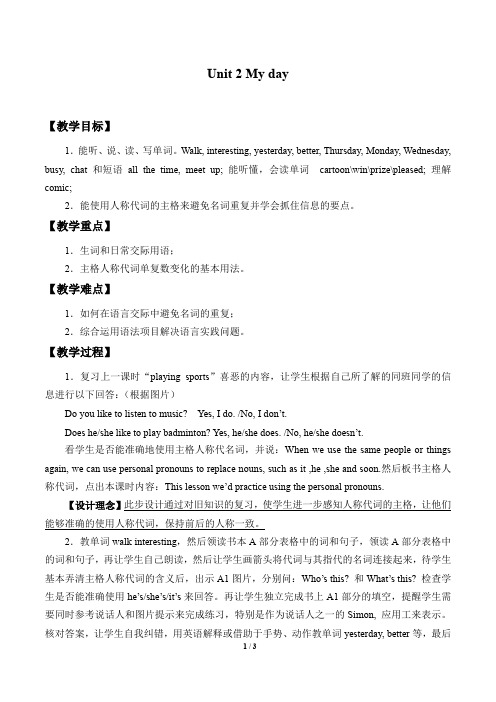
Unit 2 My day【教学目标】1.能听、说、读、写单词。
Walk, interesting, yesterday, better, Thursday, Monday, Wednesday, busy, chat和短语all the time, meet up; 能听懂,会读单词cartoon\win\prize\pleased; 理解comic;2.能使用人称代词的主格来避免名词重复并学会抓住信息的要点。
【教学重点】1.生词和日常交际用语;2.主格人称代词单复数变化的基本用法。
【教学难点】1.如何在语言交际中避免名词的重复;2.综合运用语法项目解决语言实践问题。
【教学过程】1.复习上一课时“playing sports”喜恶的内容,让学生根据自己所了解的同班同学的信息进行以下回答:(根据图片)Do you like to listen to music? Yes, I do. /No, I don’t.Does he/she like to play badminton? Yes, he/she does. /No, he/she doesn’t.看学生是否能准确地使用主格人称代名词,并说:When we use the same people or things again, we can use personal pronouns to replace nouns, such as it ,he ,she and soon.然后板书主格人称代词,点出本课时内容:This lesson we’d practice using the personal pronouns.【设计理念】此步设计通过对旧知识的复习,使学生进一步感知人称代词的主格,让他们能够准确的使用人称代词,保持前后的人称一致。
2.教单词walk interesting,然后领读书本A部分表格中的词和句子,领读A部分表格中的词和句子,再让学生自己朗读,然后让学生画箭头将代词与其指代的名词连接起来,待学生基本弄清主格人称代词的含义后,出示A1图片,分别问:Who’s this? 和What’s this? 检查学生是否能准确使用he’s/she’s/it’s来回答。
- 1、下载文档前请自行甄别文档内容的完整性,平台不提供额外的编辑、内容补充、找答案等附加服务。
- 2、"仅部分预览"的文档,不可在线预览部分如存在完整性等问题,可反馈申请退款(可完整预览的文档不适用该条件!)。
- 3、如文档侵犯您的权益,请联系客服反馈,我们会尽快为您处理(人工客服工作时间:9:00-18:30)。
Unit 4 My dayComic strip & Welcome to the unitI. Teaching aims and learning objectivesBy the end of the lesson, students should be able to:1. describe Eddie’s day;2. ask and answer questions about Millie’s day;3. use the new vocabulary to talk about the students’ own day.II. Teaching contents1. New words and phrases: wake, wake up, shall, hill, seldom, out, go out, need, rest, just, have fun, have breakfast/lunch/dinner, have lessons, after-school activity, homework, go to bed, usually, never, be late for, start, quarter, past2. New structure: I seldom go out.Some dogs just don’t know how to have fun.I’m never late for it.III. Focus of the lesson and predicted area of difficulty1. Report one’s daily activities and ask for information about others’ daily activities;2. Use seldom and never correctly.IV. Teaching proceduresComic stripStep 1 Presentation1. Learn the new words.2. Watch the cartoon and complete the table.3. Read aloud after the tape and learn the language points.(1) Shall we d o …? = Let’s do… = What/How about doing …? = Why don’t we do …?(2) go walking in the hillsgo + v-ing e.g. go swimming/shopping/fishing …(3) seldom go out = not often go out(4) need a good restneed sth. need to do sth. need sb. to do sth.(5) S ome dogs just don’t know how to have fun.4. Read after the tape and ask if the students have any problems with the comic strip.5. Play in roles and practice in pairs.T: Please play in roles and act out the story. I’ll ask some pairs to act in front of the class. Now, please practice in pairs.【设计意图:展示生词和语言点,并通过表格梳理漫画内容。
】Step 2 Consolidation1. Report and develop the story.2. Complete a short story about Eddie’s day.One day, Hobo _____ up Eddie in the morning. He wants to go walking in the _____ with Eddie. But Eddie says he _____ goes out because he is always very busy at home. After _____ up in the morning, he needs to have _____ and have another sleep. Then it’s time for _____. In the afternoon, he needs a good _____ again. What do you think Eddie does in the evening and at night? Yes, he has _____ and sleeps. Oh, Eddie is busy eating and _____ all day! Doesn’t he know how to have _____? (wakes, hills, seldom, getting, breakfast, lunch, rest/sleep, supper/dinner, sleeping, fun) 3. Check the answers and read the short story aloud.【设计意图:通过改写,考察学生对知识的掌握情况,并让学生发挥想象力改编故事,锻炼了学生的思维。
】Welcome to the unitStep 1 Presentation1. Listen to the conversation in Part B and complete the table.2. Read after the tape.3. Check the students’ understanding of some phr ases and sentences.I’m never late for school.start lessonsat a quarter past eightenjoy schoolT: OK, do you have any questions to ask me? “I’m never late for it.” Who can translate it into Chinese? What does “never” mean?4. Develop the conversation.【设计意图:通过书上提供的表格进行扩展练习。
】Step 2 Consolidation1. Complete the passage, check the answers and read the passage aloud.T: OK, you really did a good job. Now are you clear about Millie’s daily activities? Please complete this short passage about Millie’s day.Millie is a hard-working student. She ______ up early in the morning. She goes to _______ at 7:20. She’s _______ late for school. Before the first lesson starts, Millie and all her classmates do morning ________. She has lunch at ten to ________. The sc hool finishes at four ______ in the afternoon. Then it’s time for after-school ________. She always has fun. In the evening, Millie watches TV for ______ an hour. It’s her favourite time of the day. Then she needs to do her __________. She always does it carefully. She usually goes to _______ at 9:30.2. Report your day.(1) Complete the table in the book about the students’ own days.T: Now, I know something about Eddie’s and Millie’s days now. Next, I’d like to know about your day. Please write down the time and the activities in the table.(2) Practice reporting the students’ own days.T: OK, please try to report your day according to the table you finished just now. I’ll give you only two minutes to practice. Please try to make your report clea r and interesting.(3) Ask a student to report and the other students to listen carefully.T: Time is up! Are you ready to report your day? When one student is telling about his or her day, the others should listen carefully. I will ask you questions after the report. Who’d like to be the first to tell us about your day?T: Thank … for your report. Now questions for the other students. Are you ready? Question 1 …【设计意图:让学生结合自己的实际情况练习,达到学以致用。
